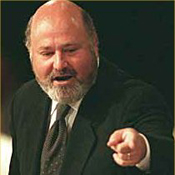
Lewis A. Fein
http://www.jewishworldreview.com -- TWO extremes characterize Hollywood's portrayal of the American male. On the one hand, there is the mythic (now recently outlawed) Marlboro Man: an anonymous yet rugged cowboy, a hero devised courtesy of effective advertising and generous marketing. For the Marlboro Man, or the actual western equivalent, the Surgeon General's warning about tobacco consumption is so much fine print; besides, a true cowboy rolls his own cigarettes.
Alternatively, there is Rob Reiner: a man wholly opposed to the manufacture, sale and distribution of tobacco. But it is not Reiner's politics that defiles American masculinity; it is his professional elevation of feebleness that leaves all men - particularly, Jewish males -- rushing toward the nearest testosterone-replacement clinic.
Start with existing stereotypes about Jewish men, which include a series of physically weak and excessively ethnic individuals. In part, this stereotype is both the product of anti-Semitic propaganda and the earnest manifestation of Hollywood's interpretation of Jewish masculinity. The prototypical Jewish male is now a neurotic actor; usually a supporting character -- one, incidentally, mastered by Reiner himself -- that, though not admittedly Jewish, nonetheless affects a New York or Yiddish accent.
Perhaps, then, few dramatic characters symbolize the above phenomenon more than Reiner's portrayal of Michael Stivik (aka "Meathead") of television's "All in the Family". And, though Stivic is not Jewish, his political beliefs are nominally "Jewish." That is, the show's creators -- many of whom are Jewish, including Norman Lear -- conflate political liberalism and religion. Hence, the ironic circumstances, whereby because or in spite of one's religion, Judaism is now nothing more than support for affirmative action, increased taxation and extreme secularism.
More to the point, perhaps Stivic is not identifiably Jewish for a more sinister reason: Hollywood maintains its inordinate fear of anti-Semitism. The American heartland can, presumably, tolerate -- at least as formulated by television's Nielsen accountants -- controversial stories about abortion, miscegenation and draft dodging, but not anything remotely Jewish. This attitude is both an insult to non-Jews, many of whom respect if not revere the basic tenets of Judaism, and further proof of Hollywood's cult of victimization.
 |
| Reiner: Always animated about something |
Still, Meathead Mike is Reiner's television alter ego. Rather, Reiner is the real-life actualization of secular liberalism and male femininity. Again, Reiner never plays an overtly Jewish character; such portrayals, if and when they rarely occur, typically involve the dutiful assistance of makeup artists and wardrobe personnel. Hollywood's interpretation of American Jewry combines the clothes of the Amish with a false beard-- - ringlets are extra.
Reiner's characters usually represent secular Jewry's image of itself: educated, wealthy and frighteningly disturbed by organized religion. In his most recent film, "The Story of Us," Reiner plays the best friend of a television writer (portrayed by Bruce Willis), whose fifteen-year marriage slowly unravels. Insert marriage counseling, tasteful decorations and an exclusive summer camp, and the viewer has the basic ingredients of a Reiner film.
At no point does religion, or the careful ministrations from a priest or rabbi, assume a significant role. Why? Because secular liberalism rejects religion, treating it as nothing more than superstition. Instead, a healthy (cinema) marriage requires drug therapy, New Age enlightenment and --- lest a lucrative demographic remain neglected - product placement. Thus the viewer witnesses scenes of Willis crying, juxtaposed against subliminal advertisements for American minivans.
In reality, Reiner simply directs what he knows: a world -- actually, the protective surroundings of Brentwood or Beverly Hills -- where the artificial is real. This is a world where people divorce regularly or habitually (middle class couples only get one shot before the matrimonial barrister); private education is a birthright; religion is dead; and yes, men cry. This is the world of secular liberalism.
Reiner's depiction of American masculinity is weak and unfortunate. His worldview excludes men of silence and substance. His is a world of mid-life crises and prescription drugs. This world is Hollywood's version of reality ... without religion.
Meatheaded,
JWR contributor Lewis A. Fein is a writer and Internet entrepreneur in Los Angeles.Comment by clicking here.
